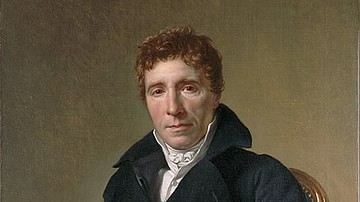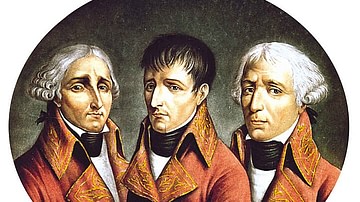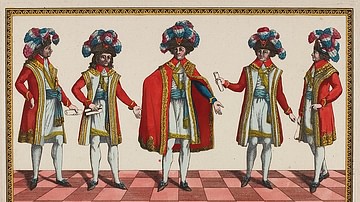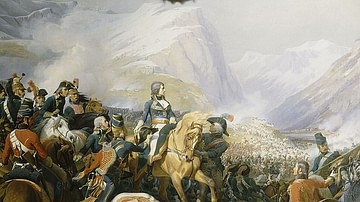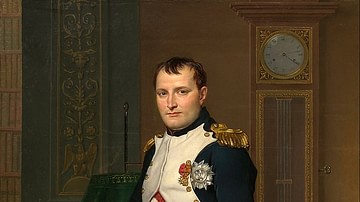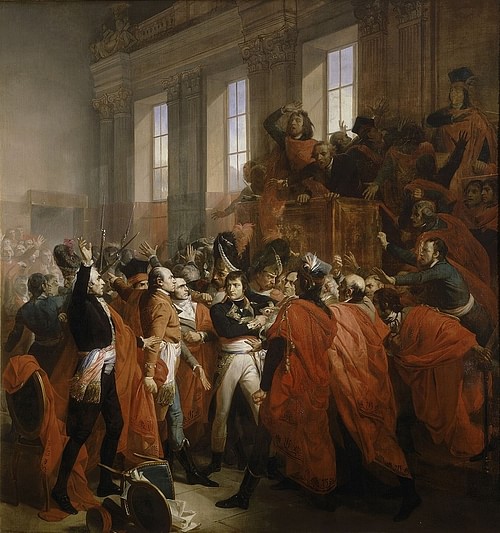
The Coup of 18 Brumaire (9-10 November 1799) was a bloodless coup d'état in France that overthrew the government of the French Directory and replaced it with the French Consulate. The coup brought Napoleon Bonaparte to power and, in the view of many historians, marked the end of the French Revolution (1789-1799).
Background: Revolutionary Fatigue
In 1799, the French Revolution entered its tenth year, and in Paris, various factions vied for power. The French Directory, the government of France since the inauguration of the Constitution of Year III in November 1795, was the center of a vicious political tug-of-war between the neo-Jacobins on the left and conservative royalists on the right. Both sides threatened to radically alter the course of the Revolution should they gain power; the Jacobins sought to implement the radical Constitution of 1793 written by Robespierrists, while a conservative victory would likely result in a return to monarchy. On the frontiers, France was embroiled in the War of the Second Coalition (1798-1802) against a new anti-French alliance of European powers. The Jourdan Law of September 1798 had called for the mass conscription of all unmarried males between the ages of 20-25, though the influx of raw recruits did little to prevent early French defeats in Germany and Italy.
These factors spoke of a terminally unstable Republic, one plagued by war, corruption, and political turmoil. After a decade of revolution, much of the French populace was tired of the chaos. Gone were the days of 1789, when the decrees of the revolutionary government were met with near-hysteric euphoria. Gone were the days of mass participation in the Revolution when popular insurrections shaped the destiny of the nation. Though the people had not forgotten the tyrannies of the old regime, such tyrannies were fading into distant memories while the strife caused by the Revolution was still present. By 1799, many people were experiencing revolutionary fatigue and were willing to welcome the first government to offer stability and tranquility, even at the cost of some of their newly won liberties.
But as the months wore on, it became increasingly clear that stability was not something the Directory could provide. Certainly, the Directory had been established with stability in mind and had been designed to maintain a careful separation of powers. The Directory was the first of France's revolutionary governments to have a two-chambered parliament: the lower chamber, the Council of 500, consisted of 500 deputies over the age of 30 responsible for proposing and writing legislation, while the upper chamber, the Council of Ancients, was comprised of 250 deputies over the age of 40 responsible for accepting or vetoing such legislation. Executive power was held by a council of five men, the Directors, who were supposed to be politically experienced men chosen by the Council of Ancients from a shortlist provided by the Council of 500. To prevent the same five men from holding power indefinitely, one Director was required to resign each year, chosen by the drawing of lots. Although certain Directors, like the cunning Paul Barras, managed to hold power throughout the Directory's lifespan, most Directors were unimpressive politicians who added to the Directory's reputation of ineffectiveness.
Despite these separations of powers, the Directory quickly fell victim to corruption and political intrigue. In the elections of April 1797, the royalists won a majority in the legislature and immediately took steps to ease restrictions on priests and émigrés. This threatened three of the moderate republican Directors (Paul Barras, La Révellière, and Reubell), who decided to stage the Coup of 18 Fructidor (4 September 1797). Enlisting the help of popular General Napoleon Bonaparte, the moderate Directors placed Paris under martial law, nullified the elections of 49 French departments, and arrested 214 conservative deputies, 64 of whom were deported to French Guiana.
The next year, when it seemed likely that the neo-Jacobins would win a majority, the Directors passed a law that disqualified 106 undesirable candidates from election, again preserving a moderate majority. In the elections of April 1799, dissatisfaction with the Directory's handling of the war led to a neo-Jacobin majority winning election in both legislative chambers. With the help of soldiers under General Barthélemy Catherine Joubert, the neo-Jacobins preemptively struck in the Coup of 30 Prairial, forcing two of the moderate Directors to resign (Barras held on to power by switching sides). Although they were all bloodless, three coups in three years did not bode well for the future of the Republic, and it was clear that a fourth, and potentially final, coup was coming. The only question was who would deliver the Directory's killing blow.
The Conspirators
Emmanuel-Joseph Sieyès had never liked the Directory. He had been offered a position as one of the original five Directors in 1795 but had refused since he was principally opposed to the Constitution of Year III. When he was offered the job again in May 1799, he accepted, not out of any change of heart, but because he realized that the time was ripe to destroy the Directory and that the best place to do it was from within. Sieyès was no stranger to political change. He had been a leading voice in the Third Estate in 1789 when it began the Revolution by forming the National Assembly. An enemy of Maximilien Robespierre, Sieyès had been forced to lay low during the years of Jacobin dominance; later, when mockingly asked what he had done during the Reign of Terror, Sieyès soberly replied, "I survived." Now, the man who had helped start the Revolution was looking to end it. All he needed now was powerful friends.
He would find that there was no shortage of powerful men hoping to profit at the Directory's expense. One such man was Charles-Maurice de Talleyrand, a dangerously ambitious man who had lost his job as foreign minister in July after he had been caught soliciting a bribe from American diplomats. Another was Jean-Jacques de Cambacérès, the influential and flamboyant justice minister who agreed to bankroll the plot. The participation of Joseph Fouché, minister of police, was quite useful; Fouché had spies everywhere in Paris, hidden amongst the city's butchers, wigmakers, bartenders, and prostitutes, and had, moreover, never been on the losing side of a coup (though the conspirators may have been dismayed to learn that Fouché had made contingency plans for their arrests should the plot go awry). The conspiracy would also grow to include Roger Ducos, another Director who was effectively Sieyès' crony, and Lucien Bonaparte, a deputy in the Council of 500 and a younger brother of Napoleon. With such a formidable lineup, the conspiracy already had a good chance at success; all it needed now was the muscle to back it up, a soldier referred to by Sieyès as his "sword".
The "sword" that Sieyès had in mind was the young, handsome, and dashing General Joubert, who had already proved useful to Sieyès during the Coup of 30 Prairial. In early August, Sieyès and Talleyrand secured for Joubert the command of the Army of Italy, so he could gain a few more victories before the coup was scheduled to launch. Unfortunately, mere days after taking command, Joubert was killed at the Battle of Novi (15 August). Sieyès was forced to search for a new "sword", one that was popular enough to secure the support of the army and the French citizenry. Of the possible candidates, few were likely to aid in Sieyès' goals. Jean Bernadotte was too much of a Jacobin, and Jean-Baptiste Jourdan, hero of the Battle of Fleurus, flat out refused to help the coup, though he promised not to hinder it either. Sieyès next courted General Jean-Victor Moreau, who was hesitant to get involved with politics. In early October, Sieyès was visiting Moreau when news arrived that Napoleon Bonaparte had just landed in France; upon hearing this news, Moreau supposedly remarked, "There is your man" (Doyle, 376).
Indeed, Napoleon was the most obvious choice. The famed conqueror of Italy, he had spent the previous year campaigning in the Middle East; though Napoleon's campaign in Egypt and Syria had ultimately been a failure, the victories he had won in the process such as the Battle of the Pyramids captured the imaginations of the French public. When he arrived in Paris on 16 October, he was hailed as a triumphant hero. Though Sieyès disliked Napoleon personally and privately believed he should have been shot for abandoning his army in Egypt, Talleyrand eventually convinced him to offer Napoleon a place in the conspiracy. After some back and forth, Napoleon accepted, and the men met in Lucien Bonaparte's house to draw up a plan.
The Plot
The plan that the men concocted called for a two-day coup. The first step was to get the Directory out of Paris; if it remained in the capital, the conspirators ran the risk that the neo-Jacobins would call the people of Paris to arms in defense of the government. So, on the first day, Sieyès was to call an emergency meeting of the Council of Ancients, who would be informed that a Jacobin plot had been discovered and that the legislature would have to meet the next day at the palace of Saint-Cloud, 11 km (7 mi) west of Paris, for its own safety. Meanwhile, Sieyès and Ducos would resign from the Directory and persuade the other three Directors to also resign through coercion and bribery. On the second day, Napoleon would visit both legislative chambers and inform them that, because of the Jacobin plots, the Republic was in danger and could only be preserved by repealing and replacing the Constitution of Year III. A provisional government would then be set up, headed by Sieyès, to pen a new constitution.
It was a dangerous plan; coups relied on momentum and stretching it out over two days risked exposing the conspiracy. Yet the conspirators decided to go forward with the plan beginning on 7 November 1799 (16 Brumaire in the French Republican Calendar). However, several of the Ancients became suspicious of the emergency meeting and had to be reassured, forcing the conspirators to delay the plot; the new 'day one' was designated for 9 November (18 Brumaire). On the night of the 7th, Napoleon dined with generals Bernadotte, Jourdan, and Moreau, in a last-minute effort to solicit their help. Moreau was persuaded to assist by arresting the Directors in the Luxembourg palace, but the other two refused; "You'll be guillotined," Bernadotte told Napoleon, who simply replied, "We'll see" (Roberts, 218). The next day, Napoleon secured the support of Colonel Horace Sebastiani and the 9th Dragoon Regiment. All was set.
Day One: 18 Brumaire
At 6 a.m. on 9 November (18 Brumaire), 60 officers of the 17th District and National Guard met at Napoleon's home on the rue de la Victoire. Dressed in civilian attire, Napoleon explained the dire situation the Republic was in and asked for their loyalties, thereby masquerading as the protector of the government he was about to destroy. Meanwhile, the Council of Ancients had gathered at the Tuileries Palace, where Lucien Bonaparte told them of the 'Jacobin plot'. For their own safety, the Ancients were compelled to sign two decrees: the first gave Napoleon command of all local armed forces, and the second officially moved the following day's session from the Tuileries to Saint-Cloud. Those Ancients deemed most likely to oppose the decrees simply had not been told about the emergency meeting and were not present. At 10 a.m., Napoleon changed into his general's uniform and rode to the Tuileries to personally reassure the Ancients. On his way, he passed by the Place de la Revolution where so many supposed enemies of the state had been guillotined during the Terror; Napoleon apparently remarked to a co-conspirator, "Tomorrow, we'll either sleep at the Luxembourg or we'll finish up here" (Roberts, 219).

Later that morning, Sieyès and Ducos resigned from the Directory and pressured the other three Directors to do so as well. Paul Barras was initially reluctant but caved in after Talleyrand offered him a bribe; Barras promptly left Paris, flanked by cavalry to ensure he did not change his mind. The other two Directors, Louis-Jérôme Gohier and Jean-François Moulin, were more resistant; early on the morning of day two, they were arrested by Moreau's troops and compelled to resign. With the head of government effectively decapitated, the coup's success hinged on Napoleon's ability to convince the two chambers to dissolve themselves.
Day Two: 19 Brumaire
Early on 10 November (19 Brumaire), Napoleon entered the chamber at Saint-Cloud where the Council of Ancients was gathered, flanked by loyal grenadiers. By this point, most of the deputies suspected that there was no Jacobin plot and that they were being subjected to a coup d'état. Upon arriving, Napoleon gave a speech:
You are on a volcano. The Republic no longer has a government; the Directory has been dissolved, the factions are agitating; the time to make a decision has arrived. You have summoned me and my comrades-in-arms to aid your wisdom, but time is precious…I only want the safety of the Republic. (Roberts, 220)
Napoleon's speech was cheered by his grenadiers, but it failed to impress the Ancients, who remained silent. Presently, one of the deputies stood and loudly asked Napoleon to swear allegiance to the Constitution of Year III as the only thing that could protect the Republic. Napoleon reminded his audience about the coups of the last three years, arguing that the constitution had already been violated and no longer had the respect of anyone and therefore needed to be replaced. Napoleon and his grenadiers then walked to the palace Orangery, where the Council of 500 had gathered.
The Council of 500, which was dominated by neo-Jacobin deputies, gave Napoleon a more hostile reception. Napoleon had barely entered the room before deputies expressed their outrage at seeing men in uniform at a government meeting. Despite a wave of shouts, Napoleon made his way to the rostrum, shouting, "I want no more of this factionalism; this must finish" In a scene reminiscent of the fall of Maximilien Robespierre, the deputies stood up with shouts of "Down with the tyrant!", "Down with the dictator!", and "Outlaw him!" Lucien, who had recently been made president of the Council, tried to restore order, but several deputies had already risen from their seats. They surrounded Napoleon, pushing, jostling, and even slapping him before the grenadiers were able to shuffle the general out of the chamber. After Napoleon left, a motion was proposed to declare him an outlaw, and several deputies forcibly held Lucien in the president's chair to keep the continued session lawful while they voted.

According to some sources, when he was told what the Council of 500 was voting on, Napoleon, who had never shown signs of fear in battles, turned pale and began to tremble. Whether or not this was true, it was clear that he had botched the second phase of the coup. The day was saved by Lucien, who slipped out of the Orangery and approached the 400 soldiers who had been stationed to guard the councils. Lucien told the soldiers that a minority of Jacobin deputies, bribed by English gold, were terrorizing the rest of the Council of 500 and had threatened Napoleon's life by brandishing daggers. He urged them to break up the meeting; when the soldiers hesitated, Lucien drew his own dagger and pointed it at Napoleon's heart, crying, "I swear that I will stab my own brother to the heart if he ever attempts anything against the liberty of Frenchmen" (Roberts, 224). This bit of theatre did the trick. The soldiers marched into the Orangery and cleared the deputies out; many of them jumped out windows to avoid arrest.
Later that night, Lucien gathered as many deputies as he could find who were supportive of the coup. With no opposition present, the deputies voted to adjourn both chambers of the legislature for four months and to expel 61 of the neo-Jacobins from the council. After voting to establish a provisional council to write the new constitution, Lucien ended the meeting, and, just like that, the French Directory was dissolved.
Aftermath
On 11 November, Sieyès, Ducos, and Napoleon were appointed as the three consuls of the provisional government, tasked with writing the constitution. Sieyès, believing he had won, intended to write the constitution himself, but he had underestimated the political ability of Napoleon, who instigated a veritable coup within a coup. Using his popularity and the sheer force of his personality, Napoleon outmaneuvered Sieyès; the Constitution of Year VIII, adopted on 24 December 1799, was largely the work of Napoleon and his allies. Sieyès was forced into an effective retirement, and Napoleon was named First Consul of the Republic's new government, the French Consulate. Most of the other conspirators, such as Talleyrand, Cambacérès, and Fouché would go on to enjoy positions in Napoleon's government. Lucien initially did as well, but eventually became disillusioned with his brother's rule and went into self-imposed exile in Rome in 1804.
Now firmly entrenched in power, Napoleon proclaimed to the nation that the French Revolution was over; though this claim had been made by every preceding revolutionary regime, this time it was true. Napoleon seemed to offer the French people the stability and permanence they desired, leading many to accept him even through his gradual transition to authoritarianism and eventual emperorship. The revolutionary period had ended; the Napoleonic Era had begun.





